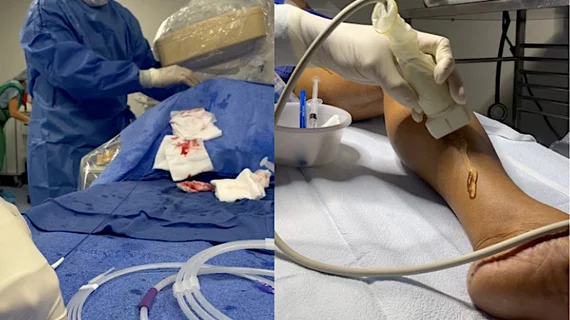Rising amputation rates spark new PAD initiative in Miami
The Miami office-based lab (OBL) Amavita Heart and Vascular Health recently launched the Miami Initiative to Stop Amputation (MISA) to tackle the rising rates of amputations due to peripheral artery disease (PAD) in Latin, Haitian and Black communities. The effort aims to boost public education about PAD and urge clinics to screen more patients for earlier detection and interventions. MISA's goal is to lower amputations by 20% over the next decade.
"Recognizing the need for early detection and intervention, MISA will focus on raising awareness about PAD within the local community, particularly among minority populations who face a higher risk. Blacks and Hispanics in Miami-Dade County are disproportionately affected by PAD and subsequent amputations. By concentrating our efforts on this condition, we hope to make a meaningful impact on reducing the incidence of amputations,” explained Pedro Martinez-Clark, MD, FSCAI, interventional cardiologist, founder and medical director of Amavita, in a statement.
Nationwide, PAD leading to critical limb ischemia (CLI) results in about 400 amputations a day, with the majority of these cases from Black and Hispanic communities. This caused the Society for Cardiovascular Angiography and Interventions (SCAI), Society of Interventional Radiology, Association of Black Cardiologists and Society of Vascular Surgeons to join forces in early 2024 to create the Get a Pulse on PAD campaign. The groups want to educate the public as well as primary care and other referring physicians about this ongoing problem.
The launch of MISA aligns with the American Heart Association’s mandate to decrease the number of amputations in the United States by 2030. The Amavita Foundation, through the MISA initiative, has a goal of reducing non-traumatic lower extremity amputations in Miami-Dade County by 20% by 2030. This starts with identifying PAD in its early stages. In advanced stages, amputation might be the only course of action for those suffering from PAD.
"When you think about the rise of amputations in a country like the United States, that's concerning because it should not be happening here. We have incredible procedures, technology and very good providers and we should be able to do better," Martinez-Clark told Cardiovascular Business.
He said the AHA's call to action and seeing the amputation issues in his own community is what prompted the creation of their nonprofit foundation.
“Amputations not only impose immense physical and emotional burdens on patients but also incur substantial healthcare costs and increase mortality rates. Mortality three years after an above-the-knee amputation can increase up to 71%," Martinez-Clark explained.
He said Cuban American patients were found to have the highest risk of PAD compared with Mexican Americans, followed by Puerto Rican patients, those with a Central American background, and Dominican American patients. Black men older than 50 had the highest rates of prevalent PAD.
MISA’s approach involves collaboration across multiple disciplines, including podiatry, endocrinology and cardiovascular care. Through educational initiatives and outreach events, the initiative aims to bridge the gap in access to cardiovascular care and empower individuals to take proactive steps toward managing their vascular health.
MISA has gained the attention and support of local U.S. representatives, who recognize the importance of addressing PAD and its impact on the community. Their involvement underscores the collaborative effort between public officials and healthcare advocates to implement effective strategies for reducing amputations and improving vascular health outcomes in Miami-Dade.
Martinez-Clark does a number o free health screenings for PAD and high blood pressure. Past efforts have centered on the Miami suburb of Hialeah, which has one of the highest percentage of participants in the country involved in the Affordable Care Act (ACA) low-cost health insurance programs. He also has focused on the adjoining town of Medley, which is lower middle class.
The Amavita Heart and Vascular Health OBL is the only one of its kind in the Miami area to perform PAD and electrophysiology procedures, usually doing five or six cases per day. The cardiovascular practice is affiliated with the Jackson Memorial Hospital System and Mercy Hospital.

